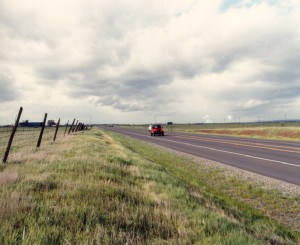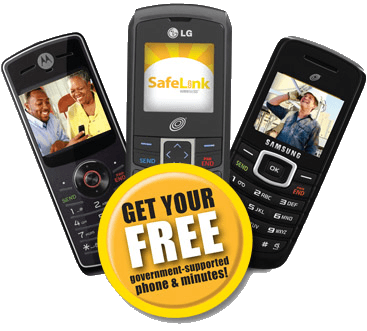Tapped Out Consumers Concerned About New Broadband Tax and Free Cellphones for the Income-Challenged
 One of the lesser-known implications of broadband reform includes major changes to the Universal Service Fund (USF), a program that collects a few dollars a month from every phone customer to help subsidize the costs of delivering service to rural America. As traditional phone lines become ever less important, a proposal to begin applying USF charges to broadband service has gotten increasing attention from conservatives who oppose the program, calling it a new “tax on broadband.”
One of the lesser-known implications of broadband reform includes major changes to the Universal Service Fund (USF), a program that collects a few dollars a month from every phone customer to help subsidize the costs of delivering service to rural America. As traditional phone lines become ever less important, a proposal to begin applying USF charges to broadband service has gotten increasing attention from conservatives who oppose the program, calling it a new “tax on broadband.”
The need for USF subsidies on rural telephone service continues to decline along with the number of landline customers. Over the history of the program, repeated abuses have been documented which have diverted funding into cell phones for school administrators, telecommunications services in decidedly non-poor or rural areas, and steering vendor contracts to providers that kick money, trips, or other gifts back to decision makers. With the FCC increasing the USF subsidy rate to 15.3 percent for the second quarter of 2010, an enormous amount of money is at stake, available for qualified programs.
So much money is available, some companies are building USF funding into their business plans. Independent rural telephone companies can make a killing on USF subsidies, which are targeted precisely at their service areas. But now cell phone companies have begun riding the USF gravy train, and are now marketing products and services that would be impossible to provide without USF funding.
One of the most controversial programs is free cellphones for income-challenged Americans, a program that first appeared during the Bush Administration, made possible by the Universal Service Fund.
To qualify, subscribers must either have an income that is at or below 135% of the federal Poverty Guidelines, or participate in one of the following assistance programs:
- Medicaid,
- Food Stamps,
- Supplemental Security Income (SSI),
- Federal Public Housing Assistance (Section 8),
- Low-Income Home Energy Assistance Program (LIHEAP),
- Temporary Assistance to Needy Families (TANF), or
- The National School Lunch Program’s Free Lunch Program
 An extension of Lifeline and Link-Up, the free cell phone program has been extended to more than a dozen states by providers like TracFone’s SafeLink Wireless or Sprint’s Assurance Wireless.
An extension of Lifeline and Link-Up, the free cell phone program has been extended to more than a dozen states by providers like TracFone’s SafeLink Wireless or Sprint’s Assurance Wireless.
Safelink provides qualified customers with free ($50 value) Motorola cell phones and free calling with no contract requirement. They also receive free texting, national/international calling, voicemail, caller ID, and call waiting.
“A telephone service, just in general, is not a privilege, it’s a right, and we feel it’s a corporate responsibility to provide it,” says José Fuentes, TracFone’s director of government relations. “Everyone should be in contact, should have the opportunity to get a phone call, especially if it’s an employer.”
Fuentes may be right, but TracFone’s altruism is made considerably easier when the federal government is picking up the majority of the tab every month. USF funding contributes $10 of the estimated $13.50 the service actually costs to provide.
Traditional Lifeline landline service has been a part of American life for decades, but the prospect of welfare recipients getting free cell phones is ready-made for demagoguery in the media. A common meme is that the program represents more “Obama socialism,” despite the fact the program began under the previous administration, and there may be nothing inherently wrong with extending Lifeline service to an increasingly wireless world.
What this really represents is the opportunity to consider different approaches to funding subsidy programs. For example, would such programs like cell phone subsidies be better served if they were funded by the carriers themselves as part of spectrum auction proceeds? Is the FCC trying to substantiate the need for continued USF spending by expanding the number of projects and programs qualified to receive funding? Is 15.3 percent a fair amount to charge telephone ratepayers?
Under the FCC’s proposed Broadband Plan for America, USF fees would be collected from and largely diverted to broadband service. Rural America would get broadband service at a price comparable to what big city residents pay, and providers could substantiate the return on investment to begin constructing such projects partly subsidized by USF funding.
But that means the price of your broadband service will increase and some consumers don’t like it.
[flv]http://www.phillipdampier.com/video/WLOS Asheville Broadband Tax 4-28-10.flv[/flv]
WLOS-TV in Asheville, North Carolina reports on concerns about a forthcoming proposed broadband tax. (2 minutes)
[flv width=”451″ height=”260″]http://www.phillipdampier.com/video/WGRZ Buffalo Free Cell Phones On Your Dime 4-8-10.flv[/flv]
WGRZ-TV in Buffalo covers the free cell phone angle as residents see ads from companies like Assurance Wireless that offer free cell phones to income-challenged Americans. (2 minutes)


 Subscribe
Subscribe
I’m curious exactly what the total amount being subsidized on their cellphone plans is? Our local provider offers one of these plans for $1/mo, and it’s equal to a $30-40 paid plan in features. It used to be that subsidized land lines were only discounted or only had a value of around $15-20/mo. For the Lifeline cellular service in my area, a person only needs to have qualified for of the below programs and a income in the range of $25,000-62,500 depending on the number of residents in their household: Supplemental Security Income (SSI) Food Stamps Medicaid Federal Public Housing… Read more »
Those who are getting upset about the free phones should realize a few things. First, if you want to be mad at anyone, be mad at the government for their failure to regulate the phone companies enough to force them to charge something closer to actual cost of providing the service. If they did that, you’d save money and low income folks might not need a subsidized phone. I wonder how cell phone rates in the USA compare to those in other industrialized countries – it sure wouldn’t surprise me if we are at the high end of the scale.… Read more »
Ok not the best place to ask but I figured I may get some ideas. Im in Rochester NY and after the last 10 days in the hospital I figured I could use a short use (couple months) cell. You loose space and time and never really know what day it is plus there are a couple of people I could use contact with. They are dealing with my care outside. I need a dumb phone. no net, no text, nothing but be able to make and get a couple of calls. 60 minutes a month should be enough and… Read more »
Uncle Ken, you are in luck: “Assurance Wireless is currently available in Michigan, North Carolina, New York, Tennessee, and Virginia.” Their web site is at http://assurancewireless.com/
Thanks much Jeff
I worked in telecom until getting hit with a rare disease. Here’s a quick summary, with advice on which to choose at the end. These plans are the modern version of the Lifeline minimal phone plan that’s been around forever – over 1/2 a century anyway. That gave you the ability to have a phone installed and connected for a few dollars and very minimal calling services. You were billed message units for all local calls depending roughly on the distance. The only add-ons you could get – which you paid extra for – were touch-tone and a short range… Read more »
Telcom: It seems to be that way more and more often these days, I got hit with the same type of thing but mine is not that rare as yours. 30 years of working making good money and bang. Nothing left. They wonder why I crash on the floor when going to radiation. They are noticing that my BP is dropping ten points a day. Im down to 110, yesterday 120 yesterday with no answers why. They need to be looking in other places. I am not afraid of the word terminal. I asked from somebody who should know the… Read more »
I have been researching this a bit more and have discovered that consumer complaints about Tracfone’s Safelink are piling up. Impenetrable customer service call menu, phones being sent to the wrong addresses, activation issues, service suddenly stops working problems, and the fact Trac is only providing 68 minutes a month all seem to be counting against it. Virgin Mobile’s Assurance is getting better reviews, although you have to apply only by phone. They give you 200 minutes a month. It’s the same subsidy — Virgin Mobile is simply more generous with the minutes they provide customers. Tracfone uses different carrier… Read more »
Thanks I figured as much for coverage. what good is a phone if it cant even
reach the end of the driveway. I did get the paperwork after the phone call
and the call was short and very smooth and they seemed to be very nice.
Maybe I should I should question if I need one at all. Maybe calling two people and a nurse or 2 but what is the chance I wont be near
a land line if I need to call. Thanks for looking.